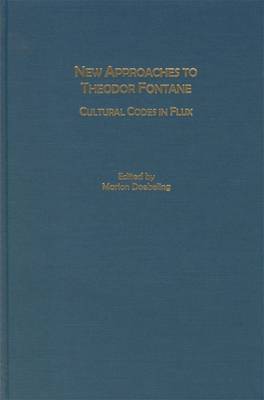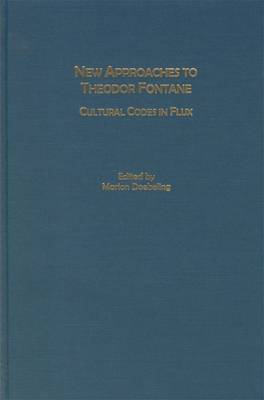
- Retrait gratuit dans votre magasin Club
- 7.000.000 titres dans notre catalogue
- Payer en toute sécurité
- Toujours un magasin près de chez vous
- Retrait gratuit dans votre magasin Club
- 7.000.0000 titres dans notre catalogue
- Payer en toute sécurité
- Toujours un magasin près de chez vous
New Approaches to Theodor Fontane
Cultural Codes in Flux
86,95 €
+ 173 points
Description
New essays on the leading German novelist of the late 19th century, Theodor Fontane, in the light of recent literary theories. This collection of essays offers eight incisive perspectives on the novels and essays of Theodor Fontane (1819-1898). While Fontane scholarship has primarily focused on the 'objective' portrayal of 19th-century German/Prussian culture and on the authenticity with which his work supposedly mirrors social reality, this collection investigates rhetorical and communicative patterns in the works that call this mirroring effect into question, emphasizing the difficulty - and ultimate impossibility - of 'realist' representation.
Here 19th-century German realism is re-evaluated as a set of normative conventions - one which, at crucial points in Fontane's narratives, breaks down. But itis precisely at these points of breakdown where some of the most repressed and excluded aspects of Fontane's culture can be uncovered.
Each of the essays reads the textual unconscious in a different way: as patterns of cultural disturbance, as the unmasking of male hysteria, as essayistic gaps, as gender prejudice. The authors present readings of Fontane that attempt to give an account of the multi-layered interplay of cultural codes and rhetorical conventions present in his time with reference to some of the most recent advances in literary, psychoanalytical, and media theory. Marion Doebeling holds a Ph.D. in German literature from the Univeristy of California, Davis.
Here 19th-century German realism is re-evaluated as a set of normative conventions - one which, at crucial points in Fontane's narratives, breaks down. But itis precisely at these points of breakdown where some of the most repressed and excluded aspects of Fontane's culture can be uncovered.
Each of the essays reads the textual unconscious in a different way: as patterns of cultural disturbance, as the unmasking of male hysteria, as essayistic gaps, as gender prejudice. The authors present readings of Fontane that attempt to give an account of the multi-layered interplay of cultural codes and rhetorical conventions present in his time with reference to some of the most recent advances in literary, psychoanalytical, and media theory. Marion Doebeling holds a Ph.D. in German literature from the Univeristy of California, Davis.
Spécifications
Parties prenantes
- Editeur:
Contenu
- Nombre de pages :
- 202
- Langue:
- Anglais
- Collection :
- Tome:
- n° 1
Caractéristiques
- EAN:
- 9781571131430
- Date de parution :
- 15-07-00
- Format:
- Livre relié
- Format numérique:
- Genaaid
- Dimensions :
- 169 mm x 237 mm
- Poids :
- 449 g

Les avis
Nous publions uniquement les avis qui respectent les conditions requises. Consultez nos conditions pour les avis.





